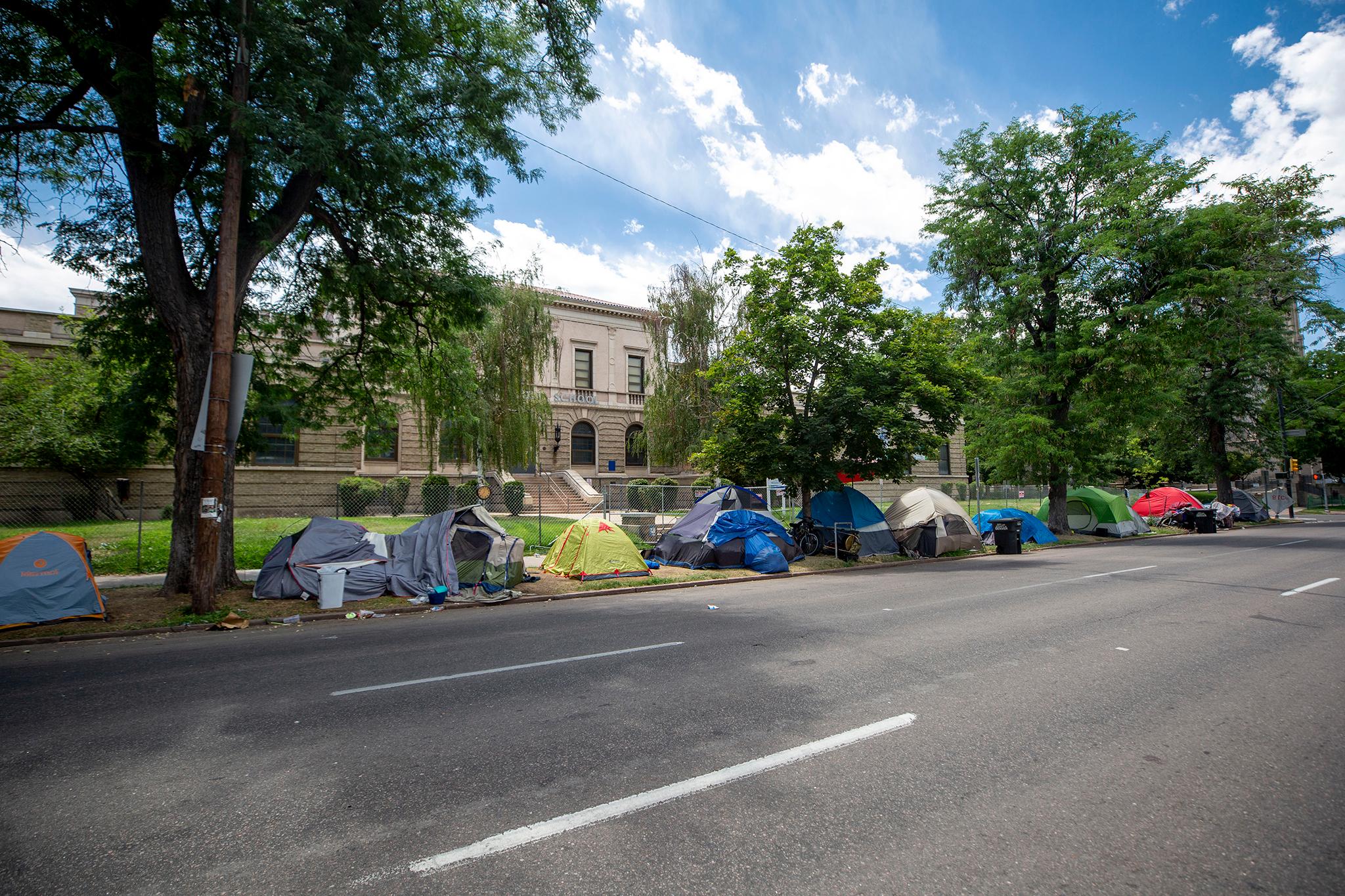When Mayor Michael Hancock announced that Denver would open sanctioned camps for people experiencing homelessness during the pandemic, he added that the city would ramp up its efforts to clear unsanctioned camps.
Sanctioned or unsanctioned, both involve people without houses living in tents in a city with an urban camping ban that's still intact. What's the legal difference between them?
The answer is simple, according to Kristin Bronson, Denver's city attorney: "One is authorized, and one is unauthorized."
Bronson said that before the city endorsed sanctioned camping, a private citizen could have allowed camping on his or her property, though zoning regulations would have had to be addressed. Bronson said that with the mayor's endorsement, the city's top zoning official is looking at what parts of the city sanctioned camping would be allowed and whether permits would need to be issued and public hearings held before a camp could be established.
Cole Chandler's Colorado Village Collaborative nonprofit is set to manage Denver's sanctioned camping, overseeing services such as bathrooms, showers and security. Chandler said he is ready to quickly meet any requirements imposed by the city. He navigated a similar process when the Colorado Village Collaborative established a tiny home village as a shelter alternative in Denver.
Chandler said he hoped to get the first sanctioned camp running by the last week of July or the first week of August. That first sanctioned camp, he said, could be a place to move people now in an unsanctioned camp near Morey Middle School in Capitol Hill.
Like Bronson, civil rights attorney Andy McNulty said the answer to whether sanctioned and unsanctioned camping differ is simple.
But McNulty, who last year convinced a county judge that the camping ban ordinance adopted by City Council in 2012 was unconstitutional, disagreed with Bronson's take.
"They're the same thing," McNulty said. "Letting sanctioned camping happen when still enforcing the camping ban is really just nonsensical."
McNulty said Hancock's embrace, albeit a reluctant one, of sanctioned camping "is a good first step by the city. I don't want to let that go unacknowledged." But he said it proves that the camping ban was less about camping than about the visibility of homelessness.
"The problem is unhoused folks existing in places that make housed people uncomfortable," McNulty said.
The city has said the camping ban remains enforceable pending its appeal of a December ruling by Judge Johnny Barajas. McNulty's client was Jerry Burton, who has experienced homelessness and raised constitutional questions in his defense after he was ticketed under the camping ban last April. Barajas concluded in Burton's case that because Denver's shelter system was inadequate, prohibiting camping amounted to cruel and unusual punishment.
Burton had been among activists who argued that instead of banning camping, the city should find ways to support people who were not served by its shelter system. Burton said that while he welcomed plans for sanctioned camping, the coronavirus has shifted his focus away from camping.
"Now we have the pandemic, it's not about tents," Burton said. "We need to be inside our own apartment or hotel room."
While the city says it can still enforce the camping ban that Burton successfully challenged, Bronson said it has held off in recent months following advice from health experts. The Centers for Disease Control has cautioned that clearing encampments during the COVID-19 outbreak can scatter people and cause them to lose touch with service providers, which could make it harder to stop the spread of the disease. Because they often have other health concerns and their immune systems can be compromised by living on the streets, people experiencing homelessness are at high risk of experiencing the worst affects of COVID-19.
"During COVID you really don't want to disrupt camps," Bronson said. But she added that when other health concerns, such as the spread of hepatitis A among people experiencing homelessness, are an issue, camps could be disrupted to allow for clean-ups conducted by the health department and unrelated to the camping ban.
Encampments such as the one around Morey have grown in Capitol Hill and Five Points.
People are losing jobs because of the coronavirus's impact on the economy, leading some to lose housing and raising fears of even more homelessness now that a freeze on evictions has ended.
Holding off enforcement of the camping ban during the pandemic also stemmed initially from "a concern about the adequacy of the shelter system," Bronson said. That concern was alleviated with the establishment of large 24-hour shelters at the National Western Complex and the nearby Coliseum, which allowed more space for social distancing. The city has also secured hotel rooms for people experiencing homelessness who need to recover from illness and for those considered most vulnerable to COVID-19.
Denver had set a goal of opening 24-hour shelters before the pandemic. Service providers have found that since the coronavirus sped adoption of a round-the-clock shelter model that included access on-site to support such as healthcare and connections to jobs and permanent housing, people who had not before ventured to shelters were coming to the National Western Complex and the nearby Coliseum. The National Western shelter for men has consistently accommodated more than the 500 guests that officials had initially expected it would hold daily.
That does not mean the city's shelter system was inadequate or unconstitutional before the pandemic, Bronson said.
But "there's no doubt that the city has recognized the need to do more and is doing more," she said. "There's just a limit to what public resources can do for this group."
Burton, the activist, said resorting to sanctioned camping undermines the city's defense of its shelter system.
"It's not adequate," Burton said. "It never will be."













